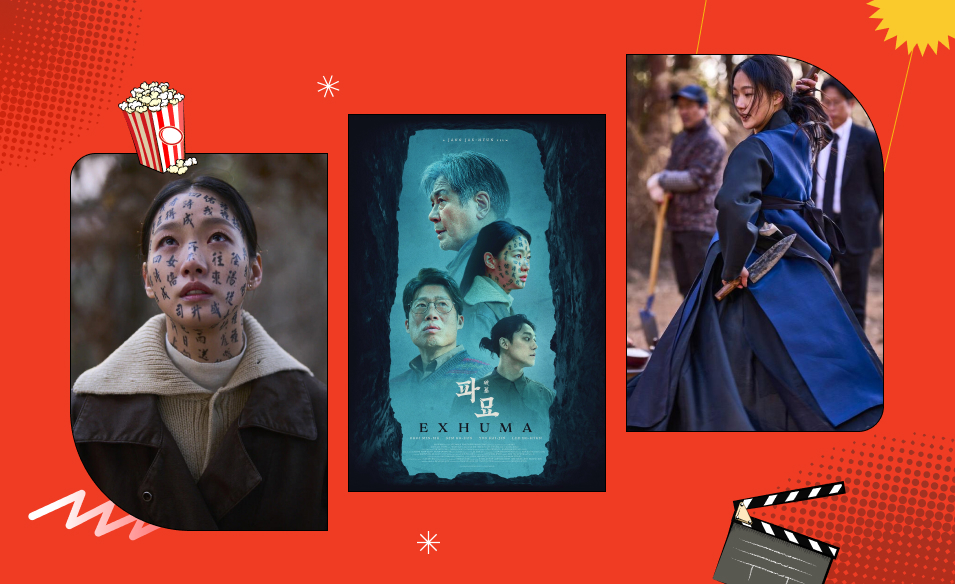Table Of Content
- Exhuma
- Cast Members
- The Plot
- Exploring Key Themes
- Supernatural and Folklore:
- Historical Trauma:
- Greed and Human Desire:
- Connection to Nature and Spirituality:
- Exhuma: The Good Parts
- 1. Cultural and Historical Depth:
- 2. Atmospheric Tension and Cinematography:
- 3. Character-Driven Narrative:
- Exhuma: What Could Have Been Better
- 1. Pacing and Structure:
- 2. Character Development:
- 3. Clarity of Themes:
- Where to Watch Exhuma?
- Dramas Similar to Exhuma
- My Takeaway
I have seen my share of horror movies. And if there is one thing that most new Korean horror movies have in common, it is the blending of traditions with the modern. Exhuma (2024) is no different!
“Exhuma” invites viewers into a world where ancient curses and modern dilemmas collide, creating a haunting narrative that lingers long after the credits roll.
As a fan of horror films, I was captivated by the film’s exploration of Korean shamanism, which adds a rich cultural layer to the chilling story.
The plot centers around Hwa-rim, a renowned shaman, and her protégé Bong-gil, who are called upon to lift a curse afflicting a newborn. Their journey through dark rituals and family secrets unveils not only supernatural horrors but also the deep scars of history.
With its blend of suspense and emotional depth, “Exhuma” promises to be a thought-provoking experience that resonates with anyone intrigued by the complexities of heritage and the past’s grip on the present.
Exhuma
| Movie Name | Exhuma |
|---|---|
| Other Names | Pamyo |
| Native Name | 파묘 |
| Directed by | Jang Jae-hyun |
| Type | Movie |
| Released | February 22, 2024 |
| Duration | 2 hrs 20 minutes (134 minutes) |
| Genre | Horror, Thriller, Mystery |
| Stars | Choi Min-sik, Kim Go-eun, Lee Do-hyun |
Exhuma isn’t your typical jump-scare horror; it’s a slow-burning descent into dread that lingers long after the credits roll.
Rooted in Korean folklore and shamanic traditions, director Jang Jae-hyun delivers a chilling exploration of the clash between ancient beliefs and modernity.
What makes this film truly stand out is its seamless blending of the supernatural with socio-political undertones, creating a thought-provoking narrative as terrifying.
The performances are nothing short of exceptional. Kim Go-Eun, as Hwa-rim, commands the screen with raw emotional depth, capturing the fragility and strength of her character in equal measure.
Opposite her, Choi Min-sik’s portrayal of Sang-deok feels grounded yet enigmatic, striking a delicate balance between earthy wisdom and creeping unease. Their chemistry anchors the film, making the supernatural elements feel even more unsettling.
Visually, Exhuma is a masterpiece. Cinematographer Lee Mo-gae transforms Korea’s rural landscapes into a hauntingly beautiful canvas.
Shrouded in mist and shadow, the stark, wintry settings are as much a part of the story as the characters. Gnarled trees, flickering ritual fires, and weathered tombstones create an atmosphere dripping with isolation and ancient mystery.
“Exhuma” focuses on depicting the long history of colonization between Japan and Korea, going beyond the ghost stories. The grandfather was eventually chastised and cursed by the Japanese for betraying Korea by fighting for Japan, as it turns out.
Given that many older viewers are well aware of the film’s legacy, opinions on how much the film concentrated on the Korean and Japanese conflicts were varied.
This isn’t just a horror movie—it’s an experience that immerses you in its rich textures and layered storytelling. For those seeking a film that marries psychological depth with haunting visuals, Exhuma is a cinematic triumph that demands your attention.
Cast Members
| Actor | Character | Type |
|---|---|---|
| Choi Min-sik | Kim Sang-deok | Main Cast |
| Kim Go-eun | Lee Hwa-rim | Main Cast |
| Yoo Hae-jin | Yeong-geun | Main Cast |
| Lee Do-hyun | Yoon Bong-gil | Main Cast |
| Kim Jae-cheol | Park Ji-yong | Supporting Cast |
| Kim Sun-young | Oh Gwang-shim | Supporting Cast |
| Kim Ji-an | Park Ja-hye | Supporting Cast |
In Exhuma, Kim Go-eun delivers a captivating performance as Hwa-rim, a shaman navigating the film’s eerie landscape. Her portrayal is both nuanced and intense, allowing audiences to feel her character’s emotional turmoil and connection to the supernatural.
Critics have praised her ability to embody the complexities of Hwa-rim, seamlessly blending vulnerability with strength, which earned her the Best Leading Actress award at the Baeksang Arts Awards.
Choi Min-sik, known for his powerful roles, brings gravitas to the film as Sang-deok. His commanding presence enhances the narrative’s tension, and his interactions with Go-eun create a compelling dynamic that drives the story forward. Min-sik’s ability to convey fear and wisdom simultaneously adds depth to his character.
Lee Do-hyun also shines in his role, complementing the established stars with a performance that balances youthful energy and emotional depth.
His chemistry with both Go-eun and Min-sik enriches the film’s exploration of themes surrounding life and death, making their collective performances a highlight of Exhuma.
Together, this trio elevates the film beyond conventional horror, creating a memorable cinematic experience.
The Plot
In the chilling horror film Exhuma, renowned shaman Hwa-rim, portrayed by Kim Go-eun, is summoned by a wealthy Korean American family to diagnose their newborn son’s mysterious illness. The narrative unfolds as Hwa-rim discovers a vengeful spirit haunting the family, compelling her to relocate the grave of the patriarch’s grandfather.
The film’s tension escalates when Hwa-rim enlists the help of Feng shui master Kim Sang-deok (Choi Min-sik) and mortician Yeong-geun (Yoo Hae-jin). Sang-deok, wary of the job’s sinister undertones, initially hesitates but is lured back by the promise of a hefty payday, especially as he faces personal financial struggles.
As they begin the excavation, ominous signs manifest—most notably when a gravedigger inadvertently severs the head of a human-headed snake, triggering a series of unfortunate events. The plot thickens when Ji-yong’s grandfather’s spirit is unleashed, leading to tragic consequences for the family.
The film intricately explores themes of ancestral curses and historical trauma, particularly during Korea’s occupation by Japan. The revelation that Ji-yong’s grandfather was a collaborator adds layers to the narrative, showcasing how past sins haunt future generations.
Exhuma captivates with its blend of folklore and horror, leaving viewers pondering the weight of history on contemporary lives. The performances are stellar, particularly Go-eun’s portrayal of Hwa-rim, who embodies both strength and vulnerability in her quest to confront the past and protect the innocent.
Exploring Key Themes
Exhuma explores several key themes that resonate deeply with audiences, intertwining horror with cultural and historical reflections.
Supernatural and Folklore:
At its core, the film delves into traditional Korean beliefs about death and spirits, presenting a haunting narrative steeped in folklore.
The concept of ancestral curses, particularly the “Grave’s Call,” serves as a powerful reminder of how the past can haunt the living, emphasizing the importance of respecting one’s ancestors.
Historical Trauma:
The film intricately weaves Korea’s painful history, particularly during the Japanese occupation, into its supernatural elements. This backdrop adds layers to the narrative, illustrating how historical injustices manifest in personal tragedies and haunt future generations.
The character of Ji-yong’s grandfather, a collaborator during this dark period, symbolizes the burdens of family legacies that can lead to dire consequences.
Greed and Human Desire:
Another significant theme is the exploration of greed and its repercussions. Characters like Sang-deok are motivated by financial desperation, which ultimately leads to catastrophic events.
This commentary on human desires highlights how personal ambitions can clash with moral obligations.
Connection to Nature and Spirituality:
The film also emphasizes a connection to nature and spiritual practices. The rural Korean landscape plays a crucial role in amplifying the film’s eerie atmosphere, while rituals performed by shamans reflect a deep-rooted belief in spirituality as a means to confront and resolve conflicts.
Exhuma: The Good Parts
I was excited to watch this movie because of the pairing of two of my favorites actors (Go Eun and Do Hyun). And needless o say, all of us like to watch a good horror movie from time to time. And these are the things that Iloved about the movie:
1. Cultural and Historical Depth:
The film intricately weaves Korean folklore with historical context, particularly the legacy of the Japanese occupation. This adds layers to the narrative, as characters confront ancestral spirits tied to their family’s past, reflecting on how history continues to haunt the present.
The exploration of themes like ancestral curses and the burdens of family legacies resonates deeply, offering a rich backdrop for the horror elements.
2. Atmospheric Tension and Cinematography:
Exhuma excels in building suspense without relying solely on jump scares. The cinematography by Lee Mo-gae captures haunting visuals of rural Korea, utilizing long takes and eerie landscapes that enhance the film’s unsettling atmosphere.
The careful use of silence and ambient sounds creates a pervasive sense of dread, making viewers feel the weight of impending doom as the story unfolds.
3. Character-Driven Narrative:
The film’s characters are not mere victims; they grapple with relatable struggles such as grief, guilt, and familial expectations.
This emotional depth makes the supernatural elements more impactful, as audiences genuinely care about their fates. The protagonist’s journey reflects modern life’s challenges intertwined with ancestral traditions, grounding the horror in real human experiences.
Exhuma: What Could Have Been Better
Even when I say that I loved the movie, there are a few areas where I personally think that they could have done a much better job. Her are the three of them that I can point out:
1. Pacing and Structure:
The film’s first half unfolds in a straightforward manner, which some viewers found slow and lacking in suspense. Critics noted that while the second half becomes more engrossing with its historical elements, the initial setup could benefit from tighter pacing and more engaging storytelling to maintain audience interest throughout.
2. Character Development:
Although the performances are strong, particularly by Kim Go-eun and Choi Min-sik, some characters lack depth. The film could have explored their backstories and motivations more thoroughly, allowing for a deeper emotional connection with the audience. This would enhance the stakes of their supernatural encounters and make their struggles more relatable.
3. Clarity of Themes:
While Exhuma tackles significant themes such as historical trauma and cultural identity, some viewers felt that these ideas were not fully realized. The film’s complex narrative could leave audiences confused about its central messages, suggesting that clearer thematic development would strengthen its impact.
Fun Trivia
- Exhuma has achieved remarkable commercial success, grossing over $97 million worldwide, making it the highest-grossing South Korean film of 2024 and the sixth highest-grossing South Korean film of all time.
- Director Jang Jae-hyun was inspired by a childhood memory of hearing urban legends and witnessing a grave exhumation while a shamanistic ritual was performed.
- The film draws heavily from Korean folklore and urban legends, particularly the story of iron rods supposedly installed across Korea during the Japanese occupation to disrupt the country’s life force
Where to Watch Exhuma?
| Platform | Availability |
|---|---|
| Amazon Prime Video | Rent or buy |
| YouTube Movies | Rent or buy |
| Tubi | Streaming in the U.S. |
Dramas Similar to Exhuma
If you enjoyed Exhuma, there are several other Korean horror films that you might like, each offering unique elements of suspense and supernatural intrigue.
One standout is The Wailing (2016), directed by Na Hong-jin. This film masterfully blends psychological terror with visceral scares, set in a remote village plagued by a mysterious illness and gruesome murders. The story follows a bumbling police officer who encounters a shaman, whose rituals may hold the key to unraveling the village’s sinister secrets.
Another film to consider is Svaha: The Sixth Finger (2019). This movie revolves around a pastor investigating a suspicious new religion linked to a series of mysterious cases. It combines elements of horror and spirituality, echoing themes found in Exhuma.
The Cursed: Dead Man’s Prey (2021) also deserves mention. This gripping narrative intertwines supernatural elements with a tale of corporate corruption as a journalist uncovers the existence of a girl capable of cursing people to their deaths. The film’s blend of horror and mystery makes it an engaging watch.
Lastly, Train to Busan (2016) offers a thrilling take on the zombie genre, focusing on human relationships amidst chaos. Its emotional depth and intense action sequences make it a modern classic in Korean cinema.
My Takeaway
Exhuma is definitely a must-watch for anyone who loves horror movies! This film brings together supernatural thrills and rich cultural storytelling in a way that really stands out.
It dives into Korean folklore and explores themes like ancestral curses and the impact of historical trauma, especially during the Japanese occupation. This makes the horror feel more meaningful rather than just about cheap scares.
The atmosphere in Exhuma is incredible. The cinematography captures the eerie beauty of rural Korea, and the haunting score sets the perfect mood to keep you on edge. Instead of relying on jump scares, the film builds tension gradually, drawing you into its unsettling world.
What really makes this film shine are the characters. Kim Go-Eun and Choi Min-sik deliver fantastic performances that add emotional depth to the story. You genuinely care about what happens to them as they deal with their personal struggles alongside the supernatural chaos.
What do you think about this movie? Let us know in the comments below and share your thoughts on this review!













